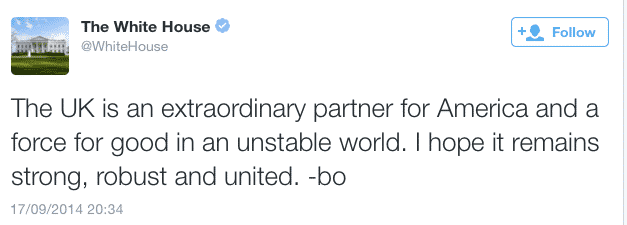 I have just returned from nearly 3 weeks in Washington. It is a political geek’s dream city with iconic everywhere! It was bizarre reading and listening and hearing about how Lincoln saved the Union while at home the Union of the United Kingdom seemed about to end. Now, the long road towards the Scottish referendum campaign has now come to an end. Everyone in the rest of the UK is relieved – I bet the voters in Scotland are even more relieved that its over – if not with the result. A clear victory for the anti-independence side as 55% of voters cast a ‘No’ vote. As Westminster politicians begin to squabble over constitutional detail it is important to assess the campaign and why the ‘No’ vote won.
I have just returned from nearly 3 weeks in Washington. It is a political geek’s dream city with iconic everywhere! It was bizarre reading and listening and hearing about how Lincoln saved the Union while at home the Union of the United Kingdom seemed about to end. Now, the long road towards the Scottish referendum campaign has now come to an end. Everyone in the rest of the UK is relieved – I bet the voters in Scotland are even more relieved that its over – if not with the result. A clear victory for the anti-independence side as 55% of voters cast a ‘No’ vote. As Westminster politicians begin to squabble over constitutional detail it is important to assess the campaign and why the ‘No’ vote won.
The Scottish referendum campaign was always going to be unique. Never before in UK history has a group of people had to look so deep into their national character and identity and truly consider their beliefs about the future of themselves and their country.
Never before has a political campaign in the UK had such attention and involvement from around the world – national US channels mentioned the first result in Clackmannanshire – which has a population of under 40 000! Politicians, business leaders, celebrities and international heads of state all had the opportunity to chime in on the Scottish independence campaign.
From the world of culture, JK Rowling, Sean Connery, David Bowie, Brian Cox, Alex Ferguson, Annie Lenox, and many more all expressed their opinion on Scottish independence. International diplomats and foreign politicians had an opportunity to voice their opinion – including President Obama, Chinese Premier, Li Keqiang, Hilary Clinton, even Pope Francis.
The Scottish referendum campaign was always going to be unique, a mixture of arguments from the heart and from the head. However Scotland voted the way it did despite the No campaign, not because of it.
Complacency
12 months ago the polls indicated that the No vote was a comfortable 20 points ahead of the Yes vote, with 15% Don’t Knows. Throughout the next 11 months the number of estimated No voters remained amazingly stable in the polls. This allowed the Better Together campaign to do the worst thing that a campaign can do – it became complacent, overly confident that it would win. Accepted wisdom, such as there is, is that a No is slightly easier to win – that change is harder to trigger. But that is no reason to for complacency – especially with such a high predicted turnout and a pseudo-despot-country 97% registered to vote.
As the No campaign sat back in assuring themselves of imminent victory, the Yes campaign continued to work hard. The number of Don’t Knows began to slowly turn into Yes votes, won over by the arguments of Alex Salmond. Then finally the shock poll published weeks before the referendum that put Yes ahead of No was enough to kick the No campaign out of its slumber. Suddenly Labour MPs were being bussed up to Scotland and the three main party leaders were out on the streets campaigning. If it was not for that one poll that put the Yes vote ahead, the No campaign may have lost. But not because of NO – that poll could have caused complacent no voters to splutter into their tea and biscuits and get out and vote. They let it run too close to the wire but that poll acted like the best GOTV tool ever.
Scaremongering
When your opponents are portraying you as the out-of-touch Westminster elite, the worst strategy to adopt would be to patronisingly and paternally argue that Scotland would not be able to govern itself and would not be given special treatment from the same Westminster elite you are trying to distance yourself from. That was the point of YES! Yet this is what the Better Together campaign did. George Osbourne warned of economic hardship in an independent Scotland and stated that Scotland would not be able to use the Pound if they voted Yes. However being told what they cannot do by a Conservative Chancellor surprisingly failed to go down well amongst the Scottish voters.
Negativity
For the majority of the campaign the tone of the No side was painfully negative. This was not the policy details, but instead the tone of the message. As the SNP talked of the exciting opportunities an independent Scotland would have, Better Together continued to say what the Scottish people would not be able to do if independent. Like a parent disciplining an unruly child, the No campaign talked down to the Scottish people. Alex Salmond played on the emotions of the Scottish character, while Alistair Darling used negative language. Weirdly it was left to Gordon Brown at the end of the campaign to passionately tell the positive message of the United Kingdom – a job that he did brilliantly well!
For years to come, Better Together will be an example of how not to run a campaign. Inability to understand the emotion of the voters, talking down to the electorate and being too self-assured and blindly confident nearly caused the breakup of the United Kingdom.
The result of the referendum may be explained by age-old head over heart thinking – the Scottish people weighing up the pros and cons of independence and coming to a logical decision. Not one driven by emotion.
For whatever reason the Scottish people voted the way they did, Alistair Darling and the Better Together campaign cannot take responsibility for it.
See head of the No to AV referendum campaign, Matthew Elliot’s view on the referendum
Gordon Brown’s speech saved the Union
Here’s my analysis of Gordon Brown’s impassioned and rabble-rousing speech he delivered last week before the referendum.
The effect of Social Media on the campaign
Some ideas on the importance and the effect of social media on the outcome of the campaign, interestingly it was not the strength of the social media strategy that won the referendum.
Image courtesy of creativedoxfoto / FreeDigitalPhotos.net


